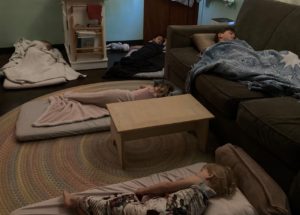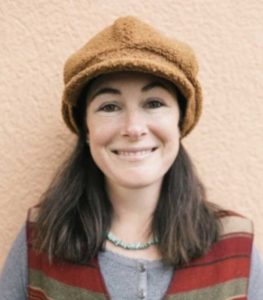Over the years as a caregiver and teacher, a common phrase for me to hear from parents has been “My child has outgrown their nap.” Ten years ago this phrase was spoken primarily about 5 year olds. A few years ago, I noticed this statement being applied to 3 and 4 year olds. This year, two families noted that their toddlers, merely 2 years old, were “difficult to get to nap,” deducing that they probably had outgrown their nap. This trend in devaluing nap time raises significant questions for me.

Does any person of any age really outgrow the physical, emotional, and spiritual needs of sleep? At which point do our bodies—our nervous system, our digestion, our heart and lungs— not benefit from deep relaxation and restoration? Is there a time in our lifespan when the activities of the day stop drawing our feelings in so many directions, and a blissful sleep isn’t helpful in bringing us back to center? Could something pivotal be lost if we no longer consider it valuable to allow our individual consciousness to loosen and mingle with…the larger Consciousness, our Spirit guides, God?
These are the questions that I have asked myself over the years, and, recently, I have begun asking the parents these same questions when the idea of removing nap from a child’s life is posed. These questions also serve to iterate that nap is considered an important part of the daily curriculum for all children ages 2-6. Nap will not be skipped at our program; instead, nap will be revered as a healer—for every person, of any age.
Imagine that you have begun your day at home. You have woken up, gotten dressed, tidied your bedroom, and prepared your body and mind for a day of work. Next, you travel to your workspace, where you meet many people, and you are asked to do many things. The tasks this day are somewhat like prior days, but today’s tasks are also novel, requiring extra energy to integrate what you have previously learned. After working for many hours, you sit down to eat lunch. You bless your meal, and you are grateful. After eating, you feel a bit somnolent—a heaviness settles in your limbs, and your thinking becomes foggy. You wash your dish and go to the restroom. Then, you drag yourself out of your wakeful slumber and get back to work.
No, silly, you do not!
Instead, imagine that someone you love and trust washes your face, hands, and feet with warm lavender water—all the while this person is softly singing. Hand in hand, this person walks you to your resting place, which is laid out invitingly. The room is already darkened, and you notice some of your fellow co-workers are already tucked under their cozy blankets. The person you love and trust lays you down, covers your body, strokes your hair, and then silently glides away to fetch another co-worker and transport him to this place of stillness. There is a rustling in the room, and you know it to be a co-worker who takes a few extra minutes to settle. Another person you love and trust, is sitting with this fidgety co-worker now—gently compressing her arms and legs on top of the blanket, all the while softly humming. The room is dark; your body is fresh; your belly is full; your blanket smells like home. You listen to the soft song and reflect upon your day, as your eyes flutter and close heavily. Your breaths are long now, and your muscles are slack. Where do you go, exactly—Heaven knows?

That feels wonderful, right? You deserve a nap like this—everyone does! At Rose Rock, the children nap from 1:15-2:45. Sometimes a child may take extra time to get to sleep, and sometimes a child may wake early; though, all of the children understand that they stay on their nap mats until the teachers chime the glockenspiel. Are some children challenging to nap when they first begin at Rose Rock? Of course, some children scream and cry when they encounter this quiet space! They don’t know what to do with it, and we often resist what we don’t know. However, with patience and resolve, all of the children learn to rest in stillness, and most of them sleep for the whole hour and a half .

My early childhood experience tells me that children do not “outgrow nap”. As we age, we simply learn how to manage without a nap. By creating a calm and quiet physical space and by holding a reverential heart space for naps, adults can gift the children in our lives with the immeasurable benefits of a midday sleep. We can also carve out time and space to give ourselves an occasional nap. How will our body, mind, and soul benefit? Heaven knows.
 Shanah Ahmadi is the Director at the Rose Rock LifeWays Center in Norman Oklahoma, and she is also a lead caregiver there. Shanah loves working with children and their parents in equal measure, and she is grateful for the impact that people large and small have upon her personal development. In her freetime, Shanah enjoys reading, hiking, writing poetry, and staring at clouds. Shanah is President of the LifeWays Board of Directors, and she also functions as the Representative Program Director.
Shanah Ahmadi is the Director at the Rose Rock LifeWays Center in Norman Oklahoma, and she is also a lead caregiver there. Shanah loves working with children and their parents in equal measure, and she is grateful for the impact that people large and small have upon her personal development. In her freetime, Shanah enjoys reading, hiking, writing poetry, and staring at clouds. Shanah is President of the LifeWays Board of Directors, and she also functions as the Representative Program Director.